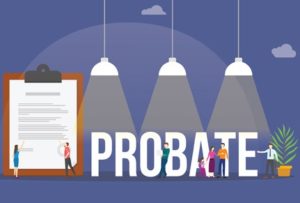What Does “Probate” Mean?

ESTATE PLANNING BRIEF
What Does “Probate” Mean?
The term “probate” is one you’ve probably heard and might associate with negative connotations. But you may not fully understand what it is. For some people, the term conjures images of lengthy delays waiting for wealth to be transferred and bitter disputes among family members. Others worry about their “dirty laundry” being aired out because the probate process is open to the public. The good news is that there are strategies you can employ to keep much or all of your estate out of probate.
Probate primer
Probate is predicated on state law, so the exact process varies from state to state. This has led to misconceptions about the length of probate. On average, the process takes six to nine months, but it can run longer for complex situations in certain states, or if an estate is subject to an estate tax. Also, some states authorize a more streamlined process for small estates.
In basic terms, probate is the process of settling an estate and passing legal title of ownership of assets, in the decedent’s individual name, to beneficiaries. If the deceased person has a valid will, probate begins when the executor named in the will presents the document to the county courthouse. If there’s no will — in legal parlance, the deceased has died “intestate”— the court will appoint someone to administer the estate. Thereafter, this person becomes the estate’s legal representative. I have used the term executor in this article because it is more well-known, but, in Florida, we use the term personal representative for an executor or executrix.
The process
With that in mind, here’s how the process generally works. First, a petition is filed with the probate court, providing notice to the beneficiaries named in the decedent’s will. The executor takes an inventory of the decedent’s property, including securities, real estate, and business interests. In some states, an appraisal of value may be required. The executor must publish a notice to creditors in a local newspaper and provide direct notice to all known creditors. Generally, a creditor must stake a claim within a limited time specified under state law. The executor must pay the claim if a valid claim is made and there are no objections. He or she must also pay any taxes and other debts that are owed by the estate.
Ownership of assets is then transferred to beneficiaries named in the will, following the waiting period for creditors to file claims. If the deceased died intestate, state law governs the disposition of those assets.
Protect your privacy
One reason many people dread the word probate is the fact that it’s a public process. Although asset information on the inventory is private, your will and most other documents would be public information. A revocable living trust may be used to avoid probate and protect privacy. The assets are typically transferred to the trust during your lifetime and managed by a trustee you designate (which can be you). Using the right strategies can protect your privacy while saving your family time, money, and the hardship of probate. We can help you implement the right techniques.
Contact us for additional information if you wish to keep your estate’s beneficiaries private.

Brett H. Sifrit
Trusts & Estates & High Net Worth Planning Attorney
941.505.9945 | bsifrit@farr.com
